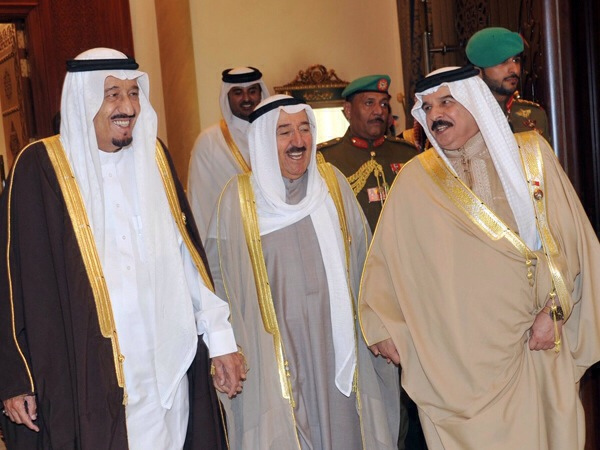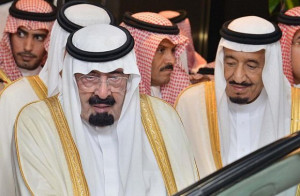China and Saudi Arabia’s $65 Billion Deal: Economic and Geopolitical Impacts


Saudi Arabian King Salman bin Abdulaziz Al Saud flew to Beijing last Thursday, March 16th, to deepen economic ties between the two powers. As Riyadh struggles to keep up with the ongoing slump in the oil market, King Salman and Crown Prince Mohammed bin Salman have launched a campaign to diversify the country’s oil-dependent economy. According to their “Vision 2030”, the three pillars of Saudi Arabia’s future success are its “status as the heart of the Arab and Islamic worlds”, its potential to become a global investment powerhouse, and its strategic location, which connects three continents. This visit was part of the king’s month-long Asian trip, which included visits to Malaysia, Japan, Indonesia, Brunei and the Maldives. The countries chosen for this trip are some of the fastest growing importers of Saudi oil, and are potential investors in the kingdom, and in Aramco.
Thursday’s visit concluded in the signing of deals worth $65 billion between the world’s largest oil exporter and the world’s second largest economy. The deals included a Memorandum of Understanding (MoU) between the giant state oil firm Saudi Aramco and China North Industries Group Corp (Norinco), to look into the construction of refining and chemical plants in China. Sinopec and Saudi Basic Industries Corp (SABIC), which already jointly operate a chemical complex in Tinajin, also agreed to develop petrochemical projects in both China and Saudi Arabia.
Stronger Saudi-China ties: How does China Benefit?
From an economic perspective, Saudi Arabia is a key location for China’s colossal One Belt One Road project. One Belt One Road is an ambitious initiative led by Chinese President Xi Jinping to build connectivity and cooperation between China and Eurasia. Saudi Arabia’s cultural, political and economic influence in the region will prove to be extremely useful for this project.
China has historically not taken sides, and is usually considered an “honest broker” in the Middle East, as it does not have the baggage that the Europeans and Americans carry in the region. Xi stressed China’s position of political non-interference in the Middle East, and emphasized, “China and Muslim countries respect each other and have set an example of harmonious coexistence between civilizations”.
However, the country has been assuming a greater role in Middle Eastern conflicts recently. In the Syrian war in 2016, China backed Bashar al-Assad’s government, and enhanced military cooperation with the regime. Moreover, Xi indicated support for Yemen’s government in its fight against Iran-backed Houthi rebels on his visit to Saudi Arabia in January 2017.
As China’s oil-dependency on the Middle East and Africa has steadily increased, so has its willingness to engage with the region politically. For instance, in 2016, Beijing began constructing its first overseas military outpost, which is a naval base in Djibouti in the Horn of Africa. It also deployed thousands of peacekeepers to U.N. missions, including in oil-rich nations such as South Sudan.
Even King Salman hinted support of a stronger Chinese presence in the region through his statement following Thursday’s fruitful visit. Salman said, “Saudi Arabia is willing to work hard with China to promote global and regional peace, security and prosperity”. He added that he hoped China would expand its role in Middle Eastern affairs.
Chinese-Saudi ties are expected to deepen as Saudi Arabia faces strains with the USA, its greatest ally. However, China also has and wants to maintain close ties with Saudi Arabia’s archrival, Iran. Sunni-majority Saudi Arabia and Shia-majority Iran have clashed most recently during the Syrian war, when China supported Iran. Xi visited both Saudi Arabia and Iran in January last year.
Both China and Saudi Arabia will be careful not to upset long-standing allies while building their bilateral relationship. As the USA also focuses on bilateral ties during the Trump presidency, Saudi Arabia has the capacity to strategically build independent relationships with the world’s largest and second largest economies. Similarly, China must balance Iran and Saudi Arabia while maintaining strong bilateral ties with the USA, its largest trading partner.
Saudi Arabia crawled into 2017, with the IMF revising its economic growth projection from 2 percent to 0.4 percent this year. Stronger economic ties with China will ensure a market for its oil exports as well as a source of potential investments in the kingdom. As the largest importer of oil, China will benefit from guaranteed Saudi oil supply, in addition to the kingdom’s support for One Belt One Road. However, this relationship also has numerous geopolitical implications. It is important to analyze the kind of player China will be. Will it adopt the Western interventionist model, or will it use its power solely to advance economic interests? With Iran, the USA and Saudi Arabia watching, it’s China’s turn to play on the world stage.

